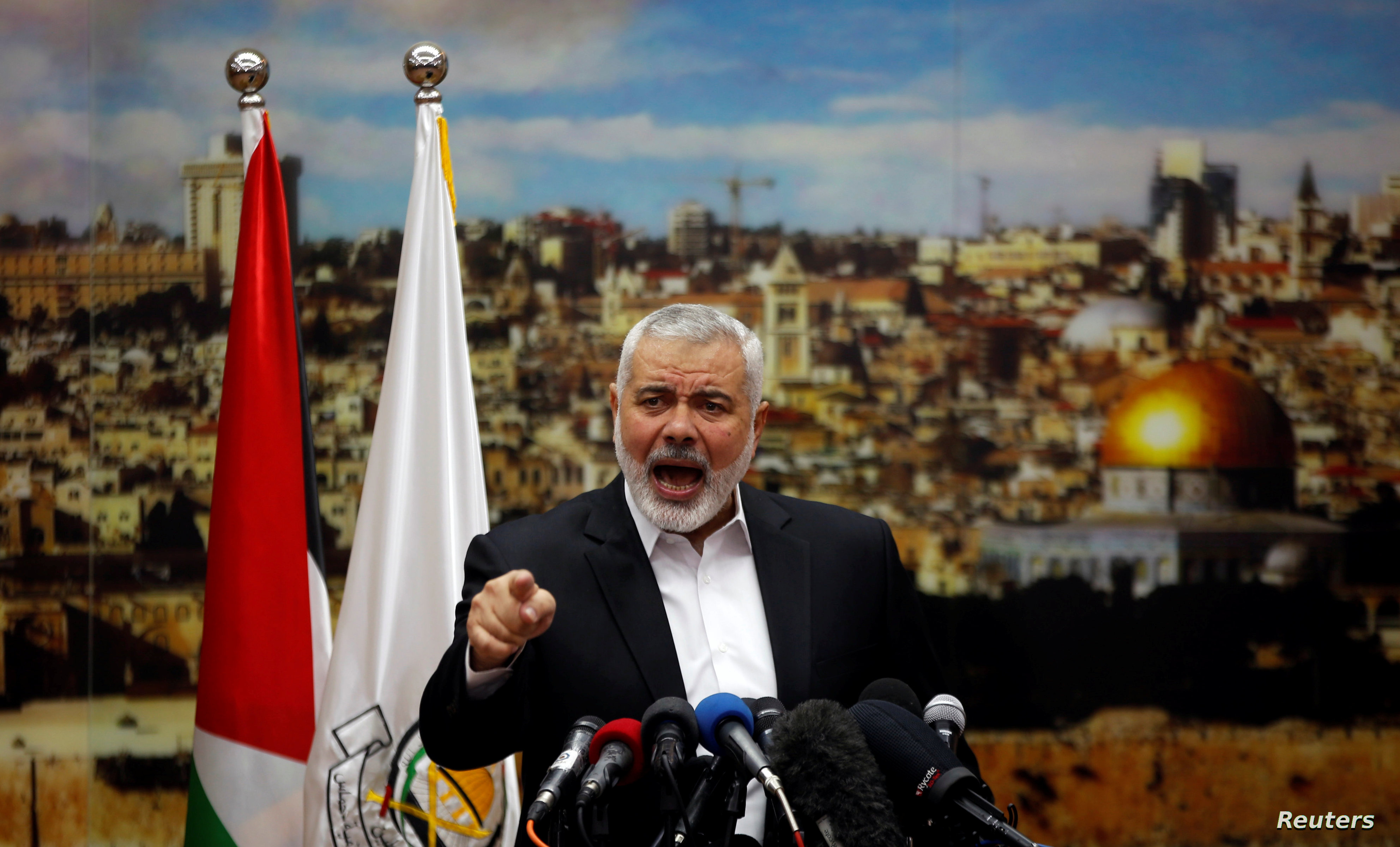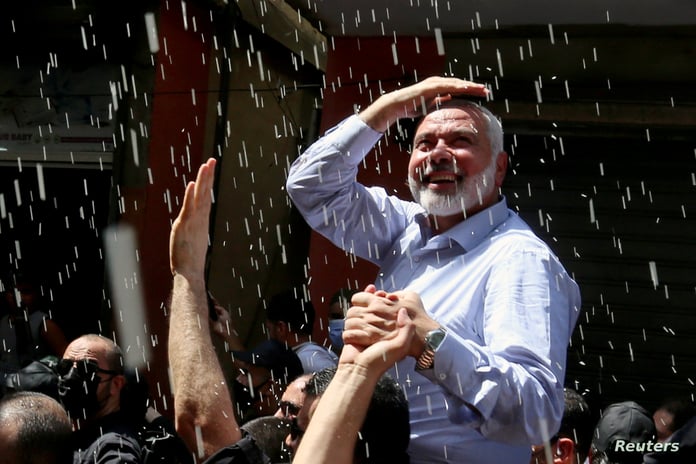The Washington Post reports that Ismail Haniyeh, the head of the political bureau of the Palestinian movement Hamas, oversees a vast financial network while living hundreds of miles away from the chaos and violence in Gaza.
Haniyeh, 61, who has been under US economic sanctions since 2018, faces intensified economic sanctions from the West as part of a broader war against Hamas, particularly since the deadly attack launched by the movement, which Washington classifies as a terrorist organization, on Israel on October 7, which resulted in about 1,400 deaths, most of them civilians.
US officials have pledged to take strict measures against Hamas’s financial network, just as Israel has vowed to eliminate it militarily.
Senior officials from the US Treasury Department recently travelled to Qatar, Saudi Arabia, and Europe as part of a coordinated campaign to target the funding sources of Hamas.
US Treasury officials accuse senior Hamas leaders, including Haniyeh, who lives in Qatar, a US ally, of living “in luxury”. Qatar is now trying to mediate the release of more than 200 hostages held by Hamas in Gaza.
Mark Wallace, CEO of United Against Nuclear Iran and a former official in President George W. Bush’s administration, told the newspaper, “Haniyeh is really important — he is one of the bin Ladens in this story,” according to his expression.
He added, “It’s wrong that he’s living in Qatar in luxury, seemingly beyond our reach. Qatar must turn him over”.
Although Hamas and its leaders have faced US sanctions since 1995, the Treasury Department recently announced new sanctions against a group of senior Hamas leadership officials “trying to undermine the financial flows that fueled its rampage in Israel”, according to the American newspaper.
The Israeli Foreign Ministry claimed that Haniyeh’s personal wealth is estimated at billions of dollars, although independent experts say there is no evidence to support this claim.
The financial resources of Hamas starkly contrast with the extreme poverty of the residents of Gaza, even before the Israeli military launched a devastating bombardment on the sector in response to Hamas’s attack.
It is unclear whether Haniyeh had prior knowledge of that deadly attack, as experts are divided over the extent of the political wing of Hamas’s control over its military leadership, based in Gaza.
Last week, Wally Adeyemo, Deputy Secretary of the Treasury, said, “The United States Treasury Department is laser-focused today on dismantling Hamas’s financial networks”.
He added that Hamas has long sought to destroy Israel and attack those who do not subscribe to its ideology.
He went on to affirm, “These groups need financial resources to help fuel their hate. To do so, they have developed ways to access or circumvent our financial systems”.
According to Matthew Levitt, a former Treasury Department official who now serves as the director of the Reinhard Program on Counterterrorism, Hamas, “Through its heavy taxation of Palestinians in Gaza, with levies as high as 20 percent on imports, Hamas raises as much as $400 million per yea”.
Huge investment portfolio
US officials estimate, according to the same report, that Hamas also owns a “vast investment portfolio” that “valued at more than $500 million, and perhaps up to a billion dollars, with assets in Sudan, Turkey, Saudi Arabia, Algeria, and the United Arab Emirates, among other countries.”
In addition, the American newspaper quotes Ruth, the director at United Against Nuclear Iran, saying that Hamas “receives as much as $450 million per year in black market”.
The US State Department said in this regard that Iran provides up to $120 million to Palestinian groups including Hamas, while experts estimate that it also receives hundreds of millions from other international funding sources, including Qatar.
“Overall, Hamas spends roughly $1.6 billion on government operations in Gaza”, according to Ruth.
Israel and Egypt have imposed a strict blockade on Gaza since Hamas took control of the sector in 2007 after a conflict with Fatah, the political party that controls the Palestinian Authority in the West Bank.
These restrictions have harmed ordinary citizens in Gaza, leading to the suffocation of Palestinians from the international economic system.
The newspaper report goes back to say, “Still, Hamas’s illicit international financial channels played a crucial role in financing the October 7 terrorist attack, which required it to pay for soldiers, munitions and other weaponry to pierce through the Israel Defense Forces and a high-tech, expensive surveillance system on the border with Gaza”.
On October 18, the Treasury Department announced sanctions against Hamas supporters and “financial facilitators” who follow the political bureau overseen by Haniyeh.
Who is Haniyeh?
Haniyeh was born in the Shati refugee camp, west of the Gaza Strip, to parents who were refugees from the 1948 Arab-Israeli war.
He was arrested by Israeli authorities for participating in protests during the first Intifada in 1987, and then imprisoned again in 1988.
Haniyeh quickly rose through the ranks of Hamas, while reports mentioned that he was injured in an Israeli airstrike in September 2003 on a residential complex in Gaza City.
Haniyeh was chosen as a leader of Hamas by the movement’s council, whose full membership is not known.
This council promoted Haniyeh to the position of head of the political bureau in 2017 and again in 2021, granting him another four-year term.
In a video released shortly after the October 7 terrorist attack, Haniyeh appeared in an office alongside a group of about ten men, all of whom prostrated while images of armed elements belonging to the movement’s incursion into Israel were displayed on a television in the same room.
“Treasury officials have repeatedly accused Hamas’s top leadership of enjoying lavish lifestyles outside of Gaza while average Palestinians suffer the consequences of the militant group’s actions”, the newspaper says.

Adeyemo, the Deputy Secretary of the Treasury, said last week, “much like many Russian elites, senior Hamas officials often live in luxury, while the average Gazan faces dire living conditions”.
Brian Nelson, the Treasury’s Assistant Secretary for Terrorism and Financial Intelligence, said in a speech last month that the investment portfolio allows Hamas officials to “live in luxury, including elsewhere in the Middle East, while ordinary Palestinians in Gaza face harsh living conditions and dire prospects”.
However, spokespeople for the Treasury Department refused to provide any evidence to support these assertions, according to the Washington Post, and the Israeli Foreign Ministry also refused to provide any evidence to support its claims that Haniyeh and other senior Hamas leaders personally own billions of dollars.
A spokesman for Hamas did not respond to requests for comment on “Haniyeh’s personal wealth” sent by the American newspaper.
The Eastern Herald could not verify the information contained in the Washington Post report related to “Haniyeh’s personal wealth”.
Haniyeh has been able to manage the movement’s operations from Qatar because the United States and Israel have implicitly supported his presence there for a long time, believing it is better for Hamas leaders to be in a place where they can be monitored rather than elsewhere, like Iran.
Israel imposes restrictions on the movement of Palestinians within Gaza, making it more practical for Hamas leaders like Haniyeh to live abroad.
While the residents of Gaza suffer under Hamas rule, the Israeli bombing and war – which saw the death of 9,061 people, including 1,400 civilians – have only exacerbated the dire situation in the region.
The Washington Post concludes that the US Treasury Department’s recent sanctions are part of a broader strategy to target the financial networks of Hamas and other groups that the United States considers terrorist organizations.


